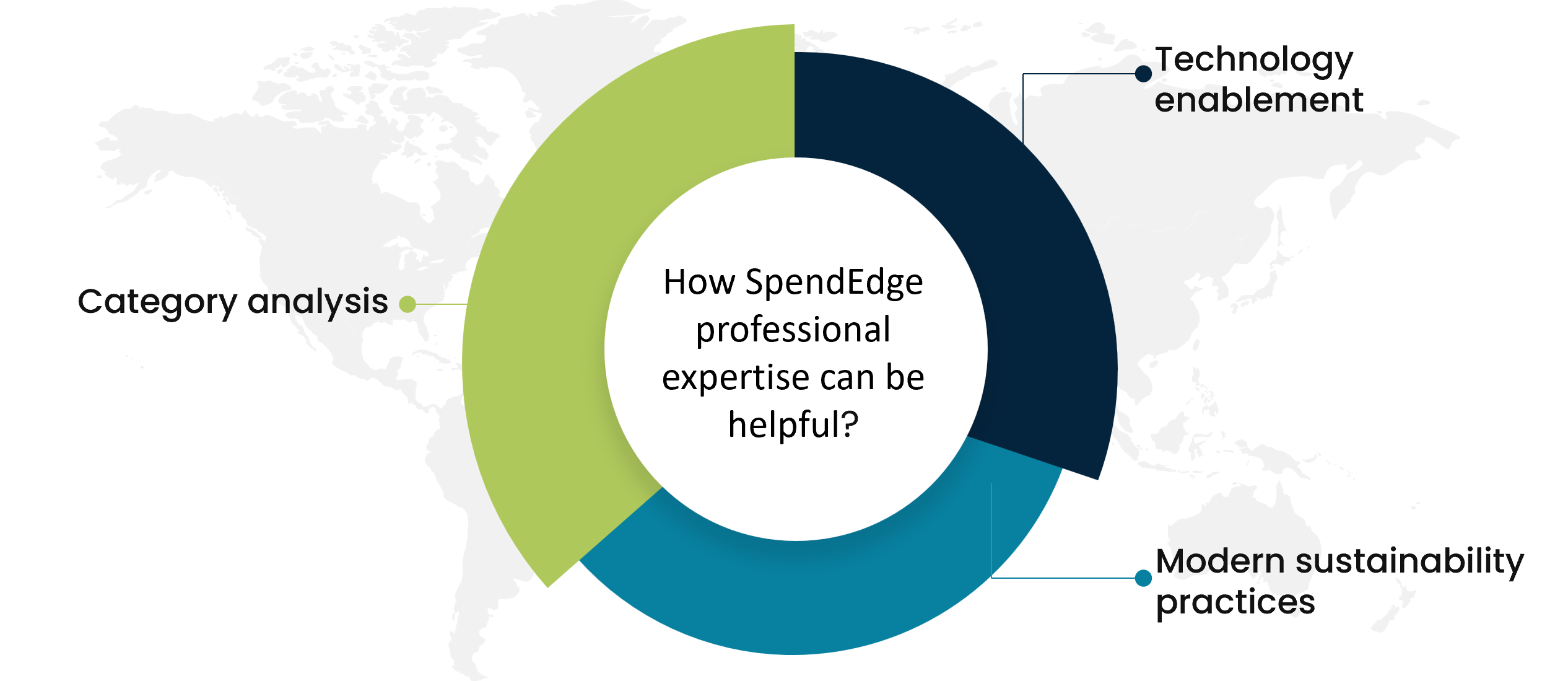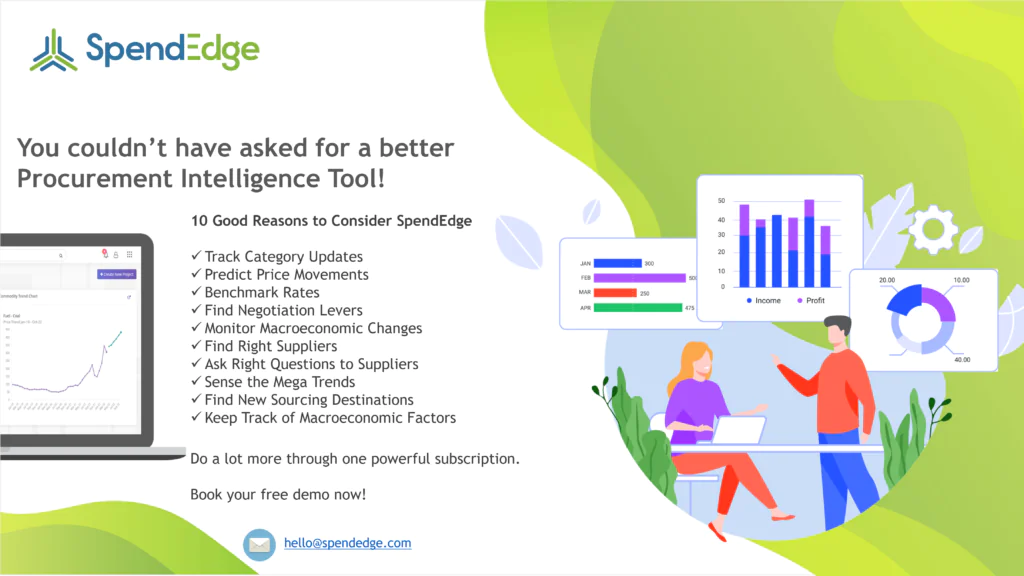By: George Mathew
The current business environment is more volatile than ever due to various factors such as geopolitical tensions, inflation, climate disasters, and technological complexity. As a result, companies are heavily relying on their procurement functions to anticipate and mitigate risks. The top influencers of procurement can vary depending on the industry and specific context. However, some common factors include market trends, supplier relationships, cost management, technological advancements, regulatory compliance, sustainability practices, and risk mitigation strategies. These influencers shape the decision-making process and help organizations optimize their procurement strategies for maximum efficiency and value.
To tackle these challenges, procurement leaders, including chief procurement officers, must be agile and prepared to adapt quickly. They should also keep themselves updated with the latest trends that are shaping the future of procurement. By continuously monitoring these developments and evaluating their impact on supply availability and costs, leaders can use this information to support strategic decision-making at the corporate level.
New trends that can help organizations elevate their procurement network
Geopolitical tensions and conflicts are impacting operations and procurement process:
Procurement is directly impacted by geopolitical tensions and conflicts, leading to various consequences. These include disruptions in operations, decreased efficiency in supply chains, increased production costs, reduced output, blockages in trade routes, and higher freight expenses. Additionally, companies must navigate stricter trade regulations and international sanctions. To ensure business continuity, procurement leaders must actively monitor and manage their exposure to geopolitical risks. Addressing these challenges involves investing in diversifying production capabilities and mitigating supply chain risks. Strategies may include capital expenditures and advanced capacity planning through effective supplier management.
Uncertainty: Impact of high cost of goods and services
The high cost of goods and services can have a significant impact on businesses, creating uncertainty in various ways. Firstly, it can lead to reduced profit margins as companies struggle to maintain competitive pricing. Secondly, it may result in decreased consumer demand as individuals cut back on spending. Additionally, businesses may face challenges in budgeting and forecasting due to unpredictable fluctuations in costs. This uncertainty can hinder long-term planning and decision-making, making it crucial for organizations to closely monitor and manage their cost structures.
Shifted focus on climate sustainability goals:
Governments around the world are implementing stricter carbon regulations, while consumers are increasingly opting for climate-friendly products. In response, more and more companies are setting net-zero climate goals and pursuing decarbonization strategies. As businesses intensify their efforts to address climate sustainability, reducing emissions generated by their supply chain has become increasingly crucial. Additionally, companies should prioritize the sourcing of sustainable raw materials. For instance, in the fashion industry, leading companies are exploring innovative uses of recycled or leftover materials in their products.
Implementation of new technologies to streamline the process:
To address the increasing complexity of operations, stakeholder involvement, and labor scarcity, companies are adopting next-generation procurement technologies. Artificial intelligence (AI), blockchain, and the Internet of Things (IoT) have become essential in procurement. These advanced technologies can be implemented throughout the procurement value chain. AI has various applications, such as streamlining workflows, minimizing human error, and enhancing decision-making. Functions like contract automation, request-for-proposal generation, and demand forecasting can benefit from generative AI. Automating decisions with AI reduces redundancy and allows managers to focus on value-adding tasks, optimizing efficiency in procurement processes.
SpendEdge services: How SpendEdge professional expertise can be helpful

Category analysis: Estimate the real cost of whatever you are buying
Utilize our category market intelligence to anticipate and respond proactively to cost and price movements. Conduct comparative analyses of suppliers on multiple parameters and achieve cost savings by engaging certified vendors from emerging markets. Conduct supplier cost comparisons for various country sourcing markets to gain more visibility on supplier costs and predict cost movements. Streamline the purchasing process to identify hidden savings opportunities and extract relevant patterns from large volumes of data. Drill down to cost elements, raw material prices, and best practices and make category decisions based on precise data on cost drivers.
Technology enablement: Understanding client’s technology needs
Our experts at SpendEdge can assist with technology enablement by understanding clients’ technology needs and providing tailored solutions. This involves conducting thorough assessments to identify areas where technology can enhance procurement operations. By digitizing procurement operations, we help streamline processes, improve efficiency, and reduce manual errors. Additionally, we specialize in developing application architecture that aligns with clients’ requirements, ensuring seamless integration and optimal performance. Through their expertise in technology enablement, we enable organizations to leverage advanced tools and systems to drive innovation, cost savings, and overall procurement excellence.
Modern sustainability practices and potential sustainability gaps:
Our supplier sustainability analysis assists in assessing the sustainability practices implemented by suppliers across the value chain to mitigate social and environmental risks and enhance brand reputation. Our analysis involves setting both short-term and long-term sustainability goals for suppliers engaged in all tiers. We evaluate the social and environmental risks associated with each supplier and monitor the compliance challenges in the supply chain. Our team also identifies the latest sustainability practices adopted globally and in geographies relevant to your company’s operations. We proactively address any existing and potential sustainability gaps to ensure that your supply chain is sustainable and responsible.
Success story: An oil and gas company sought SpendEdge expertise to solve its procurement issues
Our client, a major oil and gas company in the Middle East, faced numerous procurement challenges, from rising costs to supply chain risks and sustainability concerns, across its global operations.
Our specialist advisors at SpendEdge conducted a comprehensive analysis of procurement categories to identify areas for consolidation, standardization, and potential cost savings. Leveraging the insights from influencers and the category analysis, our experts established cost reduction strategies such as supplier consultation and negotiation. Our advisors also developed a robust risk management framework, including diversifying suppliers, conducting scenario analysis, and monitoring geopolitical events that could impact the supply chain. Additionally, our specialist advisors developed a framework for eco-friendly procurement practices, sourcing materials from sustainable suppliers, reducing waste, and enhancing energy efficiency.
Our solutions helped the client to reduce their procurement costs, contributing to increased profitability. By leveraging our solutions, the client effectively mitigated supply chain risks, ensured business continuity during volatile market conditions, and improved their corporate image and social responsibility with improved sustainability practices.

Contact us now to solve your procurement problems!
Author’s Details
George Mathew
Associate Vice President, Sourcing and Procurement Intelligence
George is a procurement specialist at Infiniti Research and provides advisory services to clients across the pharmaceutical, CPG & FMCG, energy, and automotive sectors. He specializes in the procurement areas of industry benchmarking, cost modeling, rate card benchmarking, negotiation advisory, and supplier intelligence.




